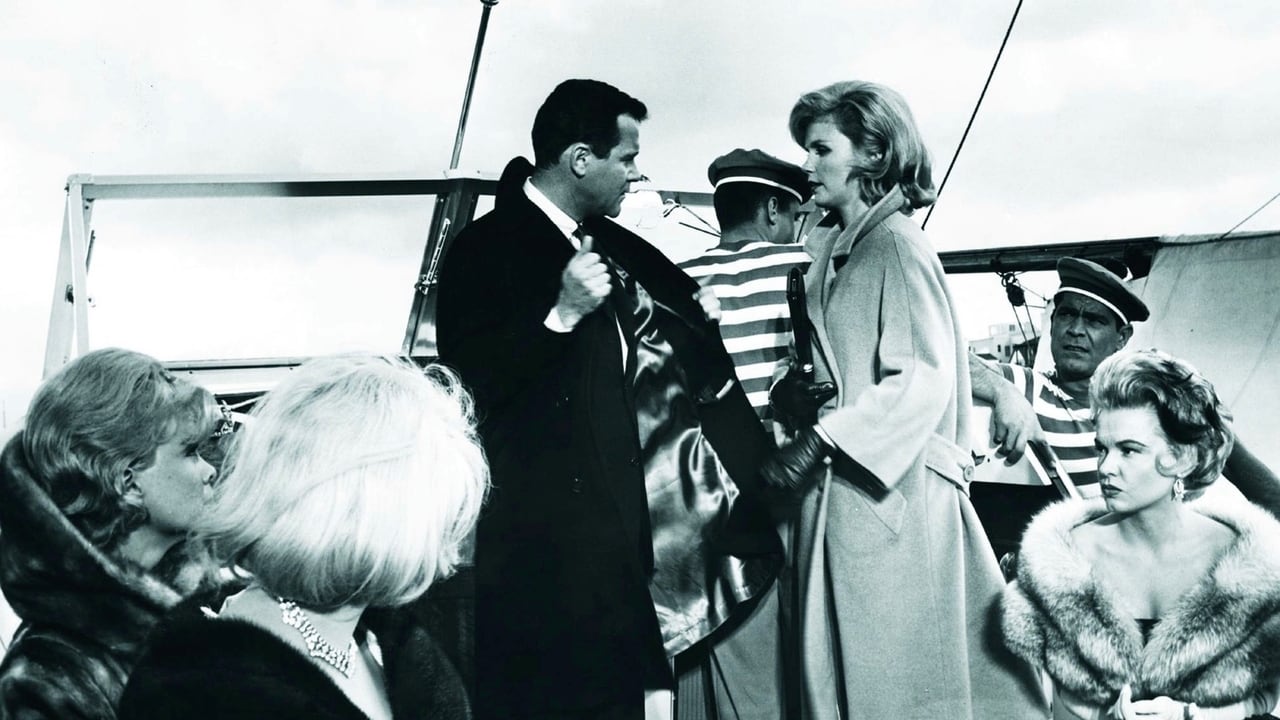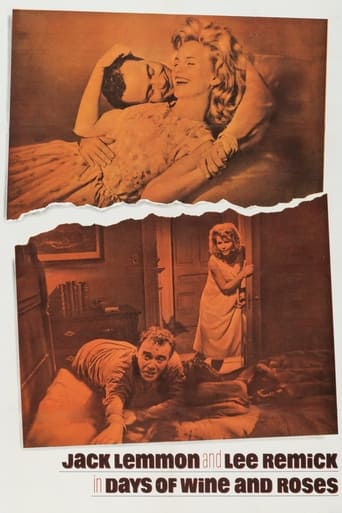



Very disappointing...
Purely Joyful Movie!
Am i the only one who thinks........Average?
an ambitious but ultimately ineffective debut endeavor.
View MoreThe movie Days of Wine and Roses is and always will be a classic. Beautiful movie. But the person who reviewed the movie is nuttier than a jar of Planters, and more crackers than Ritz. The Lost Weekend which earned Ray Milland an academy award is a brilliant movie and by NO MEANS does it have a happy ending. The man was about to kill himself. If his girlfriend hadn't come back he would have blown his brains out. A great realistic portrayal of alcoholism. Fantastic. Otherwise good review.
View MoreI had never seen this side of Jack Lemmon before. He was a very gifted and versatile performer. In this film, Lemmon, an alcoholic, but at first fooling himself that he is just a two martini lunch businessman, meets the very sober Remick. He ends up taking her out on a date and asks if she wants a drink. Remick states that she would rather eat chocolate than drink. Lemmon tells her he has just the drink for her and mixes her up a Brandy Alexander that contains creme de cacao--basically making Remick a chocolate flavored cocktail. This is the beginning of the end for Remick.Lemmon and Remick fall in love and marry. They spend their days drinking and drinking. Lemmon's alcoholism spirals out of control and he ends up being demoted and is sent away on business. Bored, Remick's alcoholism gets worse as she fills her empty time drinking. Lemmon is later fired due to his alcoholism and spends the next few years drifting from job to job.Lemmon and Remick realize that they have a problem and try to sober up together. For awhile, they are sober and working together in Remick's father's landscaping business. That all ends later however, when Lemmon ends up destroying Remick's father's greenhouse looking for stashed booze. The scene of Lemmon crawling around on the ground in the rain is particularly sad and pathetic and shows just how bad he and Remick's problem has gotten. Lemmon ends up joining AA in an effort to sober up. Jack Klugman plays Lemmon's sponsor.Lemmon appeals to Remick to join AA with him, but she won't. She doesn't feel she has a problem and feels that she can handle it herself when she wants to. Her father later tells Lemmon that his daughter has started disappearing for long stretches of time and is even picking up strangers in bars. This is a great scene between Jack Lemmon, and, by that time, old pro Charles Bickford in a very late performance in his career.The most bittersweet moment of the film is at the very end. Remick returns to Lemmon and appeals to him to make things the way they were. Lemmon says that he doesn't want things the way they were, he wants to be sober. Remick states that she likes her life better when she's drinking than when she's not. Lemmon is essentially forced to choose between his sobriety and being with her. He lets her go and Remick walks out the door, leaving her daughter and husband behind. Their daughter, seeing her mom leaving asks her father: "Will mommy ever get well?" Lemmon responds "I did, didn't I?" He looks out the window to watch Remick walk down the street - right toward a lit neon "Bar" sign.This film was so tragic and so sad, but it was also very compelling. Lemmon and Remick did an excellent job portraying two alcoholics and I liked that the film ended on a somewhat uncertain note. It seems that Lemmon will be okay, but what will become of Remick? Based on her actions in the film, things don't look rosy for her. You get the feeling that drinking is helping her hide from the fact that she IS an alcoholic, and the buzz helps her forget.
View MoreDear Alcoholics, Days of Wine and Roses (1962) is yet another film that portrays us in really bad light. The moronic ex- alcoholic protagonist (played by the great Jack Lemmon) gives up alcohol and goes back to being a square while his intelligent alcoholic wife (the achingly beautiful Lee Remick) does the right thing and walks out on him to continue being an alcoholic.How predictable right? Whats so great about the world that you need to stay sober? Parties without alcohol are the most boring on earth.Most humans are boring or vicious people.Alcohol on the other hand is a nice person. Alcohol never lets you down. Alcohol is always there. Alcohol does not have bad days. Alcohol does not switch off. Alcohol is my best friend. It can be yours too. Mans best friend - alcohol and not smelly dogs. Though dogs are OK. If you want a friend buy a bottle of JD - Godron Geeko.There aren't enough alcoholics in the world.Movies and religious fools portray alcoholics as people who need help. No. It is the non-alcoholics who need help - you with your stupid agendas and your careers and your religions and your stinking rules.How about prohibiting religion and not alcohol? Alcoholics never flew a plane into a building.Alcoholics never dropped nuclear bombs on anyone.If anything, the world needs more alcohol.Many a life has been rendered dull and meaningless due to lack of alcohol.Those dull and hot nights. Those Monday mornings. Those Sunday evenings.Those boring jobs. Those horrible people. All those bad movies.All of this can be endured with a little alcohol.So repeat after me.Alcohol for the whole of humanity.Coming back to the movie, it is not too bad. They do get some things right. Like how the corrupt jobs that decent people have to do attracts them to the bottle. Lee Remick's short speech at the end also hits the spot.It is definitely a flawed film. There are some serious plot holes. Like what happened to their kid while mom and dad were drinking. Lol! Who brought up that kid? Or did they slip some whiskey into her milk too? Hohoho! They did not show that part.Anyway, I love movies about alcoholics, whatever the message at the end might be.Best Regards, Pimpin.(7/10)
View More(Spoilers in final paragraph only)Alcoholism is not an easy subject to tackle, especially in a medium where drunken bums tend to be figures of fun. Over the years you can see an evolution in how Hollywood has treated the problem of drink as sensibilities have changed. DW Griffith's The Struggle in 1931 was a nice try but appallingly poor taste, with am unconvincing, comedy drunk act. The Long Weekend (1945) went for harrowing realism and was for the most part effective, but it fell at the last hurdle and ended up being the very thing it tried not to be – a surreal melodrama that was unintentionally comical. Days of Wine and Roses however avoids this trap by being mostly realistic, whilst adding a light a sprinkling of comedy to offset the serious moments and make the tragedy run deeper.Days of Wine and Roses is rarely laugh-out-loud funny, but the first half-hour or so has a light air of irreverence. The JP Miller screenplay gives us dialogue that really sparkles with both wit and familiarity. Take for example the "Corporation x" conversation between Jack Lemmon and Charles Bickford. It's vaguely humorous but also a credible of the kind of talks people have, and gives us a concise and engaging introduction to Bickford's character. It's also important exchanges like this actually have nothing to do with alcoholism, they are just building layers of reality and interest to give the main story its human backdrop.Miller's words are brought to life by a note-perfect cast. Jack Lemmon's performance has a slight comic edge to it, without quite being the comic-relief drunk act. He has a hint of silliness about him even when he is sober and the implication is that he has a rather crazy personality which gets exaggerated when he drinks. It works very well. Co-star Lee Remick matches and if anything surpasses him. Her portrayal of drunkenness is more realistic; appropriate because her story is really the more tragic. Charles Bickford and Jack Klugman give some perspective with two powerful – but very different – performances which are completely sober and serious. In Bickford's case it's one of the last of an incredible career, in Klugman's one of the few opportunities he really got to shine.Director Blake Edwards was a minimalist when it came to style and technique, keeping things simple to focus us on the performances. That's not to say he can't do some clever visual arrangements. One of his trademarks is the party scene, and the example here is realistic, vibrant, but never enough to upstage the characters in the foreground. In most scenes Edwards keeps his camera fixed and pans to follow the actors as they caper about, making the backgrounds a blur but the characters continually in our attention. He often lets the players take their time over a scene, allowing for moments of contemplation or protracted outbursts. The greenhouse scene is a real masterstroke. We know exactly how this one is going to pan out, and we feel powerless as it unfolds before us with painful slowness.Of course, the origin of such powerful moments is JP Miller's screenplay, his structuring and clever little vignettes. Which leads me onto one final point that makes Days of Wine and Roses stand out above its predecessors. This picture takes the step The Lost Weekend didn't dare to. It refuses to give us a happy ending, and instead leaves the story hovering in ambiguity. Why is this so important? Quite simply we could not accept it. We know Joe has already recovered and relapsed several, and his happily-ever-after is not guaranteed. To finish the story happily would seem false, and make everything that went before it just a little pointless. As it is, we are left with a chilling, lingering feeling of doubt.
View More